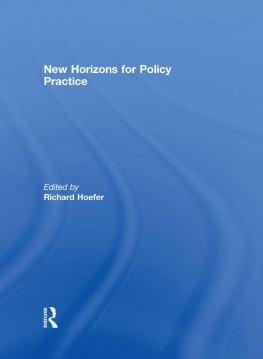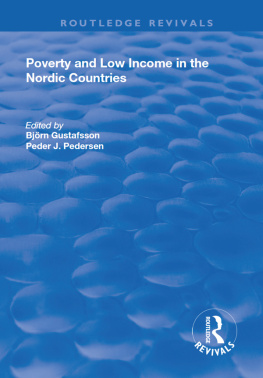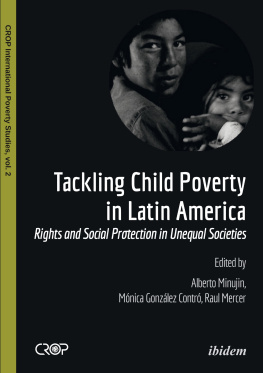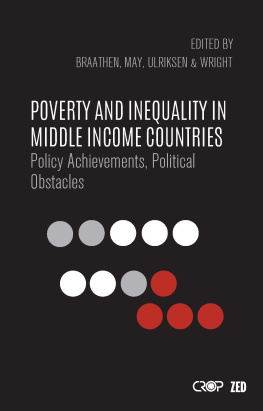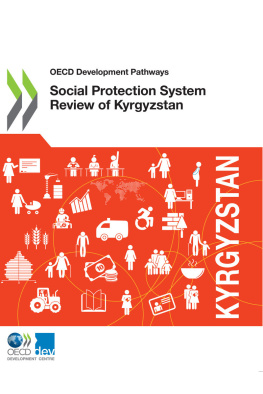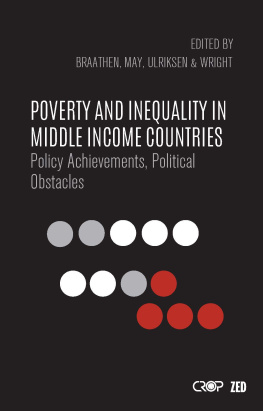Poverty, Income and Social Protection
This book provides insights into the way social protection policy is being redefined as a result of the new commitment by governments around the world to use these programs to reduce poverty. The case studies presented show how innovations in social protection have emerged in different countries. They also discuss various aspects of social protection that will be of interest to readers. While some of the case studies are primarily descriptive and seek to document recent trends in different countries, they also address important social policy issues. Others are particularly topical because they provide useful updates on recent social protection innovations. Countries discussed include Brazil, Britain, Chile, China, Indonesia, South Africa, and the United States.
This book was originally published as a special issue of the Journal of Policy Practice.
Richard Hoefer, Ph.D., is Roy E. Dulak Professor for Community Research at the School of Social Work at the University of Texas at Arlington, USA. He specializes in the areas of social policy and program administration, with a particular emphasis on advocacy, program evaluation, and nonprofit management training. He edits the Journal of Policy Practice.
James Midgley, Ph.D. is Harry and Riva Specht Professor of Public Social Services at the School of Social Welfare at the University of California, USA. He has published widely on international social welfare and social work, social development, and social policy.
Poverty, Income and Social Protection
International Policy Perspectives
Edited by
Richard Hoefer and James Midgley
First published 2013
by Routledge
2 Park Square, Milton Park, Abingdon, Oxon, OX14 4RN
Simultaneously published in the USA and Canada
by Routledge
711 Third Avenue, New York, NY 10017
Routledge is an imprint of the Taylor & Francis Group, an informa business
2013 Taylor & Francis
This book is a reproduction of the Journal of Policy Practice, Volume 11, Issue 12. The Publisher requests to those authors who may be citing this book to state, also, the bibliographical details of the special issue on which the book was based.
All rights reserved. No part of this book may be reprinted or reproduced or utilised in any form or by any electronic, mechanical, or other means, now known or hereafter invented, including photocopying and recording, or in any information storage or retrieval system, without permission in writing from the publishers.
Trademark notice: Product or corporate names may be trademarks or registered trademarks, and are used only for identification and explanation without intent to infringe.
British Library Cataloguing in Publication Data
A catalogue record for this book is available from the British Library
ISBN13: 978-0-415-52767-5
Publishers Note
The publisher would like to make readers aware that the chapters in this book may be referred to as articles as they are identical to the articles published in the special issue. The publisher accepts responsibility for any inconsistencies that may have arisen in the course of preparing this volume for print.
Contents
. |
Richard Hoefer and James Midgley |
. |
James Midgley |
. |
Anthony Hall |
. |
Yapeng Zhu |
. |
Richard Hoefer and Carolyn Curry |
. |
Silvia Borzutzky |
. |
David Piachaud |
. |
Leila Patel |
. |
Sirojudin and James Midgley |
The chapters in this book were originally published in the Journal of Policy Practice, volume 11, issue 12 (January-June 2012). When citing this material, please use the original page numbering for each article, as follows:
Poverty, Incomes and Social Protection: International Policy Perspectives
Richard Hoefer and James Midgley
Journal of Policy Practice, volume 11, issue 12 (January-June 2012) pp. 17
Social Protection and Social Policy: Key Issues and Debates
James Midgley
Journal of Policy Practice, volume 11, issue 12 (January-June 2012) pp. 824
The Last Shall Be First: Political Dimensions of Conditional Cash Transfers in Brazil
Anthony Hall
Journal of Policy Practice, volume 11, issue 12 (January-June 2012) pp. 2541
Social Protection in Rural China: Recent Developments and Prospects
Yapeng Zhu
Journal of Policy Practice, volume 11, issue 12 (January-June 2012) pp. 4258
Food Security and Social Protection in the United States
Richard Hoefer and Carolyn Curry
Journal of Policy Practice, volume 11, issue 12 (January-June 2012) pp. 5976
Reforming the Reform: Attempting Social Solidarity and Equity in Chiles PrivatizedSocial Security System
Silvia Borzutzky
Journal of Policy Practice, volume 11, issue 12 (January-June 2012) pp. 7791
Poverty and Social Protection in Britain: Policy Developments Since 1997
David Piachaud
Journal of Policy Practice, volume 11, issue 12 (January-June 2012) pp. 92105
Poverty, Gender and Social Protection: Child Support Grants in Soweto, South Africa
Leila Patel
Journal of Policy Practice, volume 11, issue 12 (January-June 2012) pp. 106120
Microinsurance and Social Protection: The Social Welfare Insurance Program forInformal Sector Workers in Indonesia
Sirojudin and James Midgley
Journal of Policy Practice, volume 11, issue 12 (January-June 2012) pp. 121136
Silvia Borzutzky, Department of Social and Decision Science, Carnegie Mellon University, Pittsburgh, Pennsylvania, USA
Carolyn Curry, Independent Researcher
Anthony Hall, Department of Social Policy, London School of Economics and Political Science, London, United Kingdom
Richard Hoefer, School of Social Work, University of Texas at Arlington, Texas, USA
James Midgley, School of Social Welfare, University of California, Berkeley, California, USA
Leila Patel, Centre for Social Development in Africa, University of Johannesburg, Johannesburg, South Africa
David Piachaud, Department of Social Policy, London School of Economics and Political Science, London, United Kingdom
Sirojudin, School of Social Welfare, University of California, Berkeley, California, USA
Yapeng Zhu, School of Government/Center for Public Administration, Sun Yat-sen University, Guangzhou, China
Richard Hoefer
School of Social Work, University of Texas at Arlington, Texas, USA
James Midgley
School of Social Welfare, University of California, Berkeley, California, USA
Throughout human history, livelihoods have been secured through work. Whether engaged in hunting or gathering, herding animals or cultivating fields, work has provided the primary means of sustenance. Of course, forced labor in the form of slavery and serfdom was also ubiquitous and formed the basis of the wealth of a small proportion of landowners and aristocrats. Although the ancient civilizations relied extensively on slavery, it was here that wage employment first emerged as way of securing a livelihood. Merchants and traders not only depended on slaves but also hired skilled labor and similarly, rulers and the aristocratic class remunerated the services of craftsmen, administrators, and military officers. This practice was institutionalized with the invention of money and the payment of monetary wages. With the growth of urban economies in Europe and the advent of industrialization, large numbers of workers were absorbed into wage employment. By the twentieth century, industrial wage employment had replaced subsistence agriculture as the primary means of securing a livelihood. This process accelerated further with the growth of services and particularly the expansion of information and financial services. Today, the majority of people in Europe and other Western countries secure their livelihoods through wage employment.



